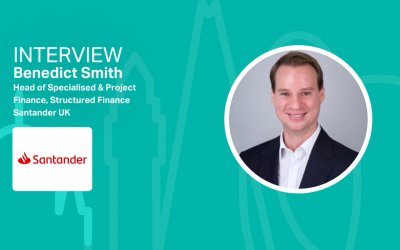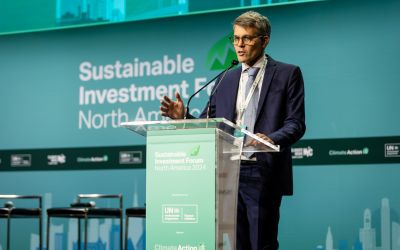COP26: Fiji’s PM says net zero race should enhance citizen’s lives and fuel prosperity
At the Sustainable Innovation Forum, Fiji’s Prime Minister, Frank Bainimarama, has called on business leaders to view the race to achieve net zero as a spur to spread prosperity and enhance the lives of citizens.

- Prime Minister Bainimarama challenges businesses to deliver real change
- Fiji to issue a blue bond to develop a sustainable ocean economy
- BMW outlines commitment to circular manufacturing processes
- Delegates call for an equitable net-zero transition
Fiji’s Prime Minister, Frank Bainimarama, has called on business leaders to view the race to achieve net zero as a spur to spread prosperity and enhance the lives of citizens.
“We have a singular opportunity to create jobs and promote gains in human wellbeing, but speeches alone will not save us. From Island communities to megacities, it is the cutting-edge leaders in sustainability that will deliver real change,” he said in his keynote opening remarks to delegates attending the Sustainable Innovation Forum in Glasgow.
But the Prime Minister stressed that businesses must raise their level of ambition and display a genuine commitment to reducing emissions and protecting the environment. “I hear CEOs talking about sustainability from the perspective of their own interests. They take their cue not from the rising sea but from the wave of public opinion. But others are bold - they see an infinite timeline and see their place, not just in terms of shareholder value, but in added value for the community,” he said.
Prime Minister Bainimarama went on to reveal some of Fiji’s own plans to promote sustainability. The first country to issue a green bond, Fiji is set to follow up with a blue (oceans) bond next year. “We are exploiting opportunities in ocean-based energy and we are looking at decarbonising shipping,” he said.
Closing his address with an invitation for investors and businesses to work with Fiji, the Prime Minister reminded delegates that countries in the developing world are keen to play their part in building a sustainable, zero carbon future.
As such, he set the tone for a day of discussions exploring the likely impact of the transition to net zero on communities and individuals as familiar industries transform themselves and economic models change.
The need for action was underlined by the second keynote speaker, Gonzalo Muñoz, UNFCCC High-Level Champion of Chile, who cited ongoing negotiations in the nearby COP26 Blue Zone. “This is the first COP at which we are talking about implementation and action. Every single thing agreed in multilateral rooms must be implemented,” he said.
Communities in the Spotlight
Complementing COP26, the Sustainable Innovation Forum has given industry leaders, policymakers, scientists and NGOs a platform to discuss the practical implications of agreed carbon reduction measures.
On Tuesday, a key theme was the relationship between the net-zero agenda and a wider range of social, economic and environmental issues. These included securing an equitable transition; aligning the net-zero agenda with the UN’s full spectrum of Sustainable Development Goals; creating circular economy models; and resilient cities.
An Equitable Transition
The transition to net zero will inevitably result in disruption to local economies both in the developed and the developing world.
Discussing pathways to an equitable transition to a net zero world, Katherine Neebe, Chief Sustainability Officer of major US power company, Duke Energy cautioned that the interests of communities should not be forgotten. “My fear is that we will maximise the environmental outcomes at the expense of the social outcome,” she said. Duke’s own clean energy investment plan involves giving workers the opportunity to gain qualifications at college and acquire new skills.
Sharan Burrow, General Secretary, of the International Trade Union Confederation also urged attention to equity. “People need to be involved. The unions need a seat at the table. Businesses need to be involved. We need national jobs and economic plans,” she said.
Mafalda Duarte, CEO, Climate Investment Funds said more work needed to be done to secure an equitable outcome in developing countries. “There is a lack of information on what transition means. There is a limited understanding of how transition will play out,” she said.
Sustainable Development Goals
There was, however, broad agreement that the recent focus on climate would not stand in the way of progress towards meeting the UN’s Sustainable Development Goals. Speaking in a panel, Steven Kukoda, Executive Director of the International Copper Association, said a worldwide transition to green energy would, in fact, be an enabler for the delivery of goals such as the eradication of poverty and hunger and the promotion of better health and education. “Energy underpins all the other SDGs - education, poverty, women and girls. Women and girls are disproportionately affected by energy poverty,” he said,
But Sanda Ojiambo, CEO and Executive Director, UN Global Compact, warned that even with finance in place, the developing world continues to face real challenges as decarbonisation gathers pace. “Without finance, we can’t create the world we want to create. The money is there, but what is more urgent is the way that money is spent and how it will allow people a transition that is just,” she said.
The Circular Route
Creating circular economic models was seen as an important route to taking carbon out of production processes and - more generally - limiting wider environmental degradation. A presentation by BMW illustrated the opportunity but also the challenges ahead.
The carmaker brought a prototype vehicle made completely of recyclable parts to the forum as an illustration of what can be achieved if there is a determination to minimise the environmental cost of manufacture. As Adrian van Hooydonk, Senior Vice President, BMW Group Design, explained, BMW intends to move towards greater use of “secondary “materials” in coming years. But creating a fully recyclable production model faces challenges. “We need a supply chain,” he says. We need a constant supply of recyclable materials.
The observation illustrated radical decarbonisation initiatives are seldom in the gift of a single organisation. Partnerships - coalitions of the willing - will generally be required to bring new ideas to the marketplace. A challenge but also an opportunity for suppliers.
As a series of discussions illustrated, circularity can take many forms. Often it is thought of simply in terms of recycling, but it can extend much further. In a debate on resilient cities, Jason Wood, head of Sustainability at Cleveland stressed that the city’s circular economy plans were addressing issues such as food supply chains. “Recycling is just part of the answer,” he said. “We are also seeking to localise food production, reduce waste and shrink the footprint of transport by creating self-contained districts.”
Echoing Fiji’s Prime Minister, Wood stressed that Cleveland’s goal was to improve equity, prosperity and environmental outcomes for the city’s residents.
Throughout the day, it became apparent that marrying decarbonisation with beneficial social and environmental outcomes is a complex undertaking requiring many stakeholders. The need to get those stakeholders - be they suppliers, citizens, government bodies or NGOs - talking to each other is a prerequisite for change at scale. Getting people around a table is what the Sustainable Innovation Forum has been doing this week.
Missed the Sustainable Innovation Forum at COP26? You can watch all sessions on demand here.

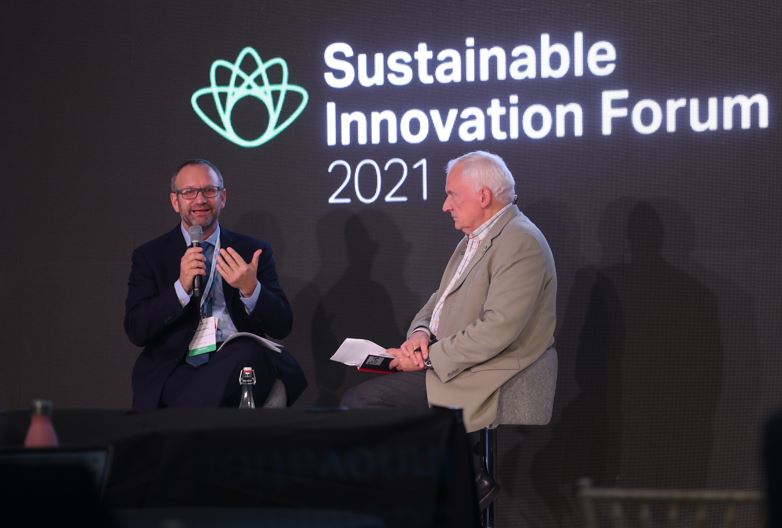

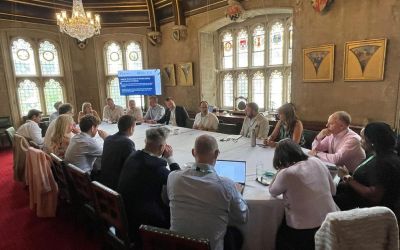
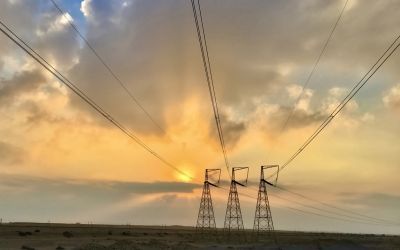
_400_250_s_c1.png)
